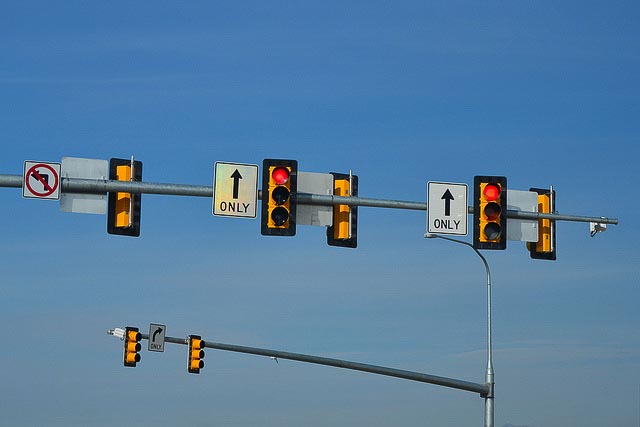While the Urban Edge strives to provide readers with daily news and insights about urban policy, we’re also voracious readers of city news ourselves. As part of a weekly feature, Senior Editor Ryan Holeywell highlights the week’s most interesting articles from around the web about urban policy and city life.
New light system in Atlanta designed to help traffic move efficiently
Atlanta's traffic signals are so old that operators have to manually program the lights on site. That doesn't work in a bustling city. So the city is buying new lights, at $100,000 a piece, that will allow for a more efficient traffic flow. The new lights coordinate with cameras and metal detectors so they know how many cars (not to mention bikes and pedestrians) are present. As a result they can automatically prevent some backups, Marketplace reports.
A Denver suburb bets big on free Lyft rides to light-rail
Disabled transit customers who can't walk to transit stations typically use "dial-a-ride" services that are notoriously expensive for governments and inefficient for customers. Centennial, Col. is launching a pilot to give citizens the option of instead using free Lyft rides to get to and from the Denver suburb's light-rail station, City Lab reports. Planners say the service will almost certainly be less expensive than the existing dial-a-ride, which costs the transit system $21 per one-way trip and requires advance sign-up.
Blah City: Why aren't we creating great urban spaces anymore?
"The world has plenty of great new skylines: Dubai, Kuala Lumpur, Seoul, Shanghai, Shenzhen, Singapore, and so on," writes Governing's Alex Marshall. But beyond the skyline and on the ground, those skyscrapers sit on antiseptic super blocks. It seems nobody is building great new urban spaces anymore. The problem may be that many of the classic "urban" places emerged from pedestrian and streetcar infrastructure, while today, cities develop places for cars.
For L.A., the act of simply building transit won't shape the form of the city in the 21st century. It will need a more comprehensive approach to city planning, or else it will wind up with extensive transit infrastructure that goes unused, the Los Angeles Times writes. That means L.A. Metro will have to work closely with cities to invest in crosswalks and sidewalks and promote land-use regulations that promote walking
Bike-share trips become mesmerizing droplets of light in these animated maps
A pair of German designers used GPS data from bike share systems to create sexy visualizations of the services in use. The representations of bikes zipping across places like New York City and Berlin are reminiscent of a meteor shower. Check out the videos, courtesy of Vox.






